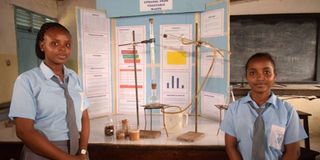AU launches campaign to promote girls’ participation in STEM

Winnie John (left) and Mercy Mwende from Changamwe Secondary School in Mombasa were among the national finalists in Kenya National Science and Engineering fair 2019.
What you need to know:
- AU-CIEFFA launched Africa Educates Her campaign, which seeks to highlight the experiences of learners at primary, secondary and tertiary education levels during the Covid-19-related school lockdown.
- We must review legislation and ensure they support girls and women embracing the science courses.
- Female teachers and education officials in the continent challenged to come up with educational-related activities to attract girls to science courses.
Covid-19 has affected more than 133 million female learners across the continent according to the Africa Union International Centre for Girls' and Women's Education in Africa (AU-CIEFFA).
The agency estimates that 10 million of them may not continue with education when all schools in the continent resume after the Covid-19 lockdowns.
AU-CIEFFA recently launched Africa Educates Her campaign, which seeks to highlight the experiences of learners at primary, secondary and tertiary education levels during the Covid-19-related school lockdown.
The campaign gives voice to the views of young African women, youth and educators on what should be done to promote, encourage and protect girls’ right to education.
The agency last Tuesday held AU’s fifth high level meeting themed Leveraging Arts and Culture to Increase Women’s Participation in Stem Education.
The meeting attended by ministers of gender and education, discussed how the continent can collectively leverage on their vibrant arts and thriving culture to ensure girls and women are empowered to participate in, and contribute to the growth of their nations through embracing Science, Technology, Engineering and Math (Stem) courses.
Gender stereotyping
Ms Doris Mpounou, director and AU representative, Save the Children International, said relevant stakeholders should evaluate what they do to make girls interested in Stem courses.
“We need to remove gender stereotyping that discourage our girls from taking science-related courses. We must also review our legislation and ensure they support girls and women embracing the science courses,” said Ms Mpounou.
Namibia’s education deputy minister Faustina Caley, lamented that there are so many girls in primary and secondary schools, but fewer in colleges and universities, especially those taking Stem courses.
The minister challenged female teachers and education officials in the continent, to come up with educational-related activities to attract girls to science courses.
She pointed out the need for a curriculum that promotes investment in girl-child education in science-related courses.
Kenya’s Public Service and Gender Cabinet Secretary Prof Margaret Kobia who read President Uhuru Kenyatta’s speech, noted that most of the African culture hinders girls and women from fully enjoying their rights.
Not in school
Prof Kobia said the country has made strides in advancing gender equality and empowerment of girls and women particularly in education.
“Kenya has tried to achieve gender parity in basic education and have witnessed a significant increase in the number of girls enrolling for secondary and tertiary education in the country,” said Prof Kobia.
She noted that the government has tried to level the playing field for girls and women including providing sanitary towels, ensuring girls return to school after getting pregnant and setting up a multi-agency to accelerate efforts towards eradicating child marriage and Female Genital Mutilation (FGM).
Dr Edward Addai, Unicef Representative to the AU noted that it is sad millions of girls across the continent are still not in school.
Dr Addai said there is need to deal with some of the gender stereotyping derailing girls from having education.
“We must have substantive gender equality in Stem courses and ensure we transform our education system to make girls go and remain in schools,” he said.
AU Commissioner for Social Services Amira Elfadil, stressed the need for the continent to prioritise retention and inclusion of girls in schools.
“Africa needs a robust campaign to weed out child marriage and FGM, which are some of the worst challenges facing girls,” he said.





